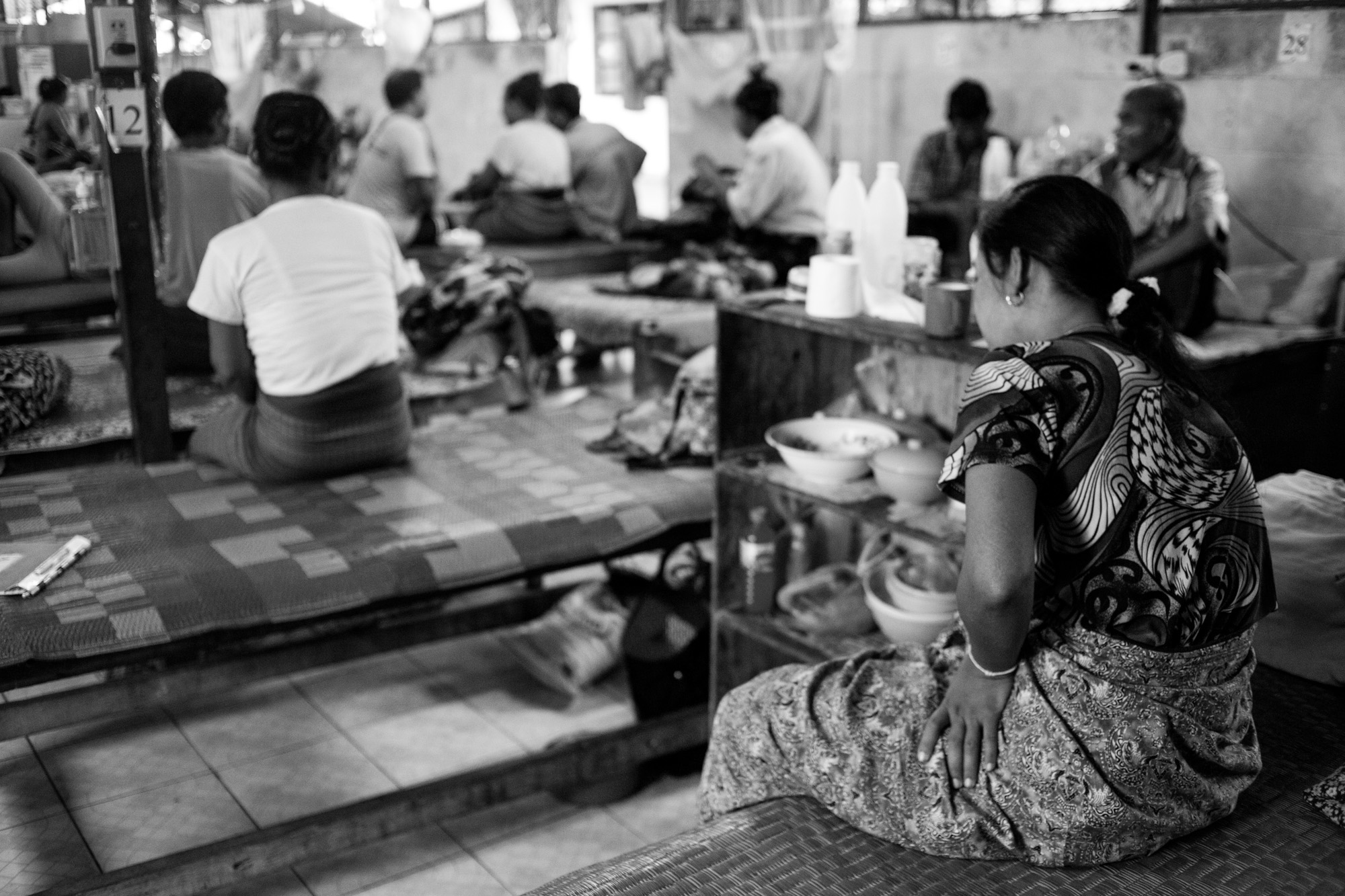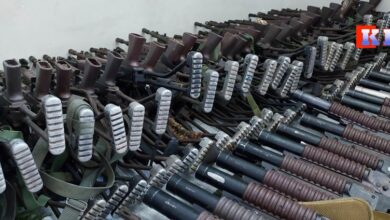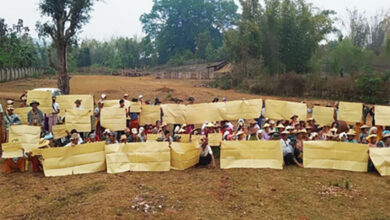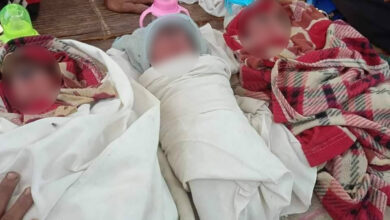Exiled by HIV/AIDS, Patients Speak Out

An estimated 38 million people are living with HIV globally. Half a million of those are in Thailand and a further 200,000 in Burma. Yet HIV is treated with harsh stigma in the two countries, where people suffer discrimination, are abused – some kill themselves. People from Burma and Thailand who had HIV spoke to Karen News of how they lived in fear and were forced to treat HIV in secret.
Mah Mah, 38, a migrant worker from Mae Sot on the Thai Burma border, recounted the day, eight years ago, she found out she had HIV.
“I felt like killing myself. If people find out I have HIV they will hate me,” she said grasping three bottles of medication she had just received at Mae Tao Clinic (MTC), which provides free healthcare to tens of thousands of migrant workers and people from Burma each year.
Mah Mah, her face covered with tanaka, said that her life was difficult because people in Thailand and Burma treated those with HIV with contempt or hatred.
“My husband also has HIV and is so sick he can no longer work. I do housework for 130 baht ($US 4) a day to support us.”
Mah Mah lost contact with her family in Burma following her contraction of HIV. “I haven’t spoken to my family for eight years because I know they would disown me if they found out that I had HIV. I am scared and ashamed if they found out so I can’t really speak with them.”
Mah Mah said that because of the community stigma, HIV statistics could be much worse than official figures show. “HIV could be a big problem, but people keep it secret and so no one really knows,” she added that she had learned to cope with HIV and others should learn to accept her.
“Now I know how to live by myself and survive. My message to others would be don’t be afraid of people with HIV. We can still eat together and spend time together.”
The Hidden Health Crisis
Dr Narong Sahametapat, permanent secretary for public health, was quoted in The Bangkok Post as stating that only 250,000 of Thailand’s estimated 500,000 HIV cases knew they had the virus and had entered treatment – emblematic of the confusion and lack of education on the issue.
According to the UN AIDS 2013 World Report, 20% of those with HIV in Thailand were denied health services because of discrimination, 14% were denied family planning services, while 26% were refused employment. In Burma, a massive 35% of people reported being denied family services because of HIV discrimination. And because HIV patients often keep their illness a secret even from family members and close friends, the real figures could be much higher.
The stigma against those living with HIV is often due to misinformation; recent advances in antiretroviral treatment means that those with HIV can now live longer, healthier lives than before. Yet the majority of those with HIV around the world do not have access to the drugs they need. In 2013, the World Health Organisation noted that while close to 10 million people were now receiving antiretroviral therapy (ART) in low and middle income countries, almost 19 million other people who needed ART did not have access to the drugs.
And in spite of the advances in ART drugs, HIV/AIDS remains the world’s leading infectious killer. An estimated 36 million people have died so far, 1.6 million people died of HIV/AIDS in 2012 alone and a further 2.3 million people were newly infected with the virus that same year.
The Doctor
Doctor Voravit Suwanvanichkij, a research associate at the Centre for Public Health and Human Rights, Johns Hopkins Bloomberg School of Public Health, is a specialist in health policy issues confronting Southeast Asia, particularly Burma. In an interview with Karen News, he warned that Burma faced an HIV epidemic.
“The Burmese government’s health budget, although it has increased many times compared to five years ago, it remains close to $10 per capita per year. And most of the expenditure is likely going into things like infrastructure and overdue staff salaries. As a result, AIDS remains a major cause of death in the country,” he said, adding, “Around 200,000 [people] are estimated to live with HIV/AIDs in Burma, and the country faces an epidemic that is mostly concentrated, particularly in men who have sex with men, injection drug users, and sex workers.”
Dr. Suwanvanichkij said that many issues were behind HIV in the region.
“I think it is easy to try to pin it down to one or two issues but the reality that drives the problem of HIV is much more multi-faceted. Yes, issues such as lack of sex education and drug use do feed in, but the problem is also a result of stigmatization and discrimination of those with HIV and the drivers of the epidemic… sex between men, injection drug use, sex work.”
Dr. Suwanvanichkij noted that the HIV epidemic was further compounded by Burma’s decrepit healthcare system and the scale of the issue could be far greater than first realised. “The problem with this data echoes problems with so much other health data from Burma: with a health system that has been wrecked through decades of neglect and disinvestment, reliable figures are difficult to come by, including for priority diseases such as HIV/AIDS, and under-reporting is likely,” he said.
Thailand’s HIV infection rate is roughly 1% of the population. The rate for patients attending MTC is similar, at 1.08%, but Dr. Suwanvanichkij said that the true extent of HIV infection on the ground inside Burma could be much far higher than Thailand. “The reality affecting stigmatized communities on the ground, those bearing most of the burden of infections in Burma, will be largely hidden,” he said, adding that Burma’s growing drug trade coupled with the decimated healthcare system could quickly spread HIV. “With ongoing increases in narcotics production in Burma, an issue directly linked to ongoing failures in ethnic reconciliation and widespread official corruption, the combination remains a dangerous one for the unchecked spread of HIV and its consequences in Burma.”
The Factory Worker
Aung Soe, 46, a cement factory worker from Bangkok, told Karen News that living with HIV was to live everyday in fear.
“When I first found out I had HIV I was terrified. If people knew I had HIV I would lose everything. When I take medicine at the factory I lie and say it is painkillers so my workmates won’t suspect I have HIV,” he said, folding up the arms of his pin-striped shirt, “If my boss found out I had HIV he would kick me out, and my workmates would not speak to me.”
Aung Soe, who did not use his real name because of concerns for his safety, said that the day discovered he had HIV was one of the most difficult times of his life.
“I first found out ten years ago, I didn’t take the medicine at first because I was depressed and refused to believe I had it. I couldn’t even tell my wife because I was scared she would leave me. One day she found out when she caught me taking the medicine, but she accepted me.”
The Nurse
Thaw Thi Lay Paw, head of the HIV program at MTC, confirmed to Karen News that her patients suffered from community discrimination.
“Those who are HIV positive suffer a lot of mental problems – including depression and suicide, often from drug overdoses. HIV people even suffer from stigma from their own family.”
Thaw Thi said that HIV was a growing health issue in the migrant community of Mae Sot, which has an estimated 170,000 migrant workers.
“HIV is a serious problem. It is usually sexually transmitted and the big challenge facing us is that people don’t use condoms. This is because of a lack of education.”
Thaw Thi said that there were not enough free anti-viral drugs to treat everyone in Mae Sot. “Opportunistic infections are a major health concern for HIV patients, we are aware of more than 450 people needing treatment for opportunistic infection last year because of HIV, but we only have funding to treat 40 with antiviral medication,” she added that the average cost of a monthly dosage of antiviral drugs was in excess of 2,000 baht ($US 60) which as far more than what people could afford. According to Mae Sot General Hospital figures, a further 558 people required treatment for HIV related diseases in 2011.
Messages of Hope
Aung Soe said he was thinking about becoming an activist. “I want to be an HIV rights activist. I don’t think it is right that I have to live my life a lie when it comes to hiding my HIV. I want to fight this stigma. My message to others is that we need to understand each other. If you have HIV you are still the same person.”
Mah Mah also wanted to help others who had HIV. “I want to give counseling to fellow HIV patients because I know exactly what feelings they are having and when I caught it other people did the same for me and encouraged me not to give up. I feel satisfied when I can share some of my experiences with other HIV patients. What I would tell them is, don’t feel sorry for yourself. Think about your future because other people have HIV and you are not alone.”




